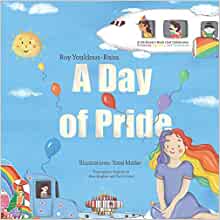
by Roy Youldous-Raiss, , Illustrations by Yossi Madar, with Alex Maghen (Translator), Yanir Dekel (Translator)
It’s an exciting day, the Pride parade is on and everyone is going! The bright and bumptious display is carefully watched by the colourful Rainbow fairy, but there’s an unwelcome visitor close at hand. It seems the wicked Witch of Shame is out to ruin Pride and even has her sights set on the Rainbow fairy!
This book is full of colourful fun illustrations that have enough going on in them to add layers to your storytelling. Young children ages 2-5 will love the intricacies of the drawings and the smiling happy faces. The intrigue brought by the Witch of Shame will keep their interest piqued and the discussions flowing. Older children 5-7 will enjoy revisiting the story and it would be a good addition to a school library as a self-esteem resource, especially for those interested in LGBT issues
A day of Pride will be welcomed by diverse families everywhere. It’s charming and energetic and the addition of finding the author’s family shows how friendly a story it really is. The story itself is a simple one and highlights the need for children to feel ‘comfortable with who they really are’. With Pride parades so bold and widespread in cities and towns around the world A day of Pride is bound to interest questioning children and open discussions about tolerance and acceptance.
I adored the Rainbow fairy and so pleased that her grace and vibrancy shone through even the darkest challenge! I felt the tensions caused by the Witch of Shame (maybe there would be a more poetic translation, but it does the trick). The only issue I had was with the often clunky rhyme scheme, but a good storyteller will work this out. I can see a place for this book in Early Years shelves with lots of follow-up craft activities to complement library sessions.

